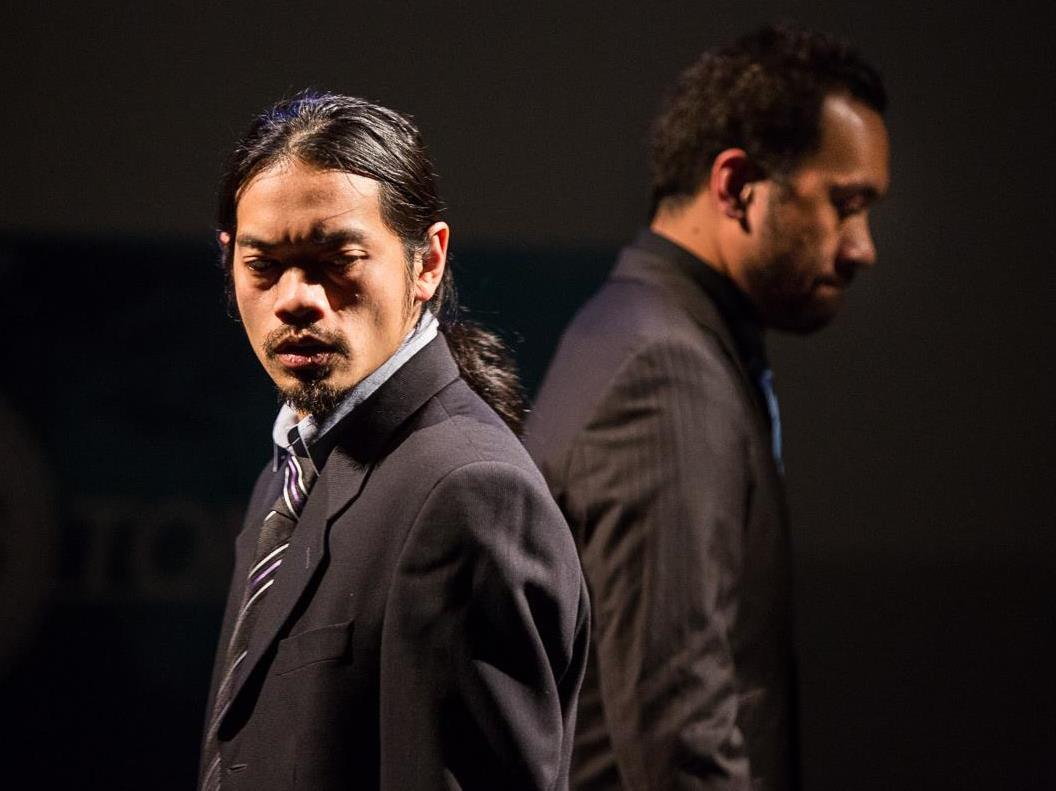Photo Peter Casamento
Candlelight Productions has a mission to provide a forum where the most challenging issues of today are discussed to galvanise positive change. The website describes the production company’s ethos as ‘strengthening individuals within community to make a positive impact on society and culture’.
Eugene Wong set up the production company thirteen years following the September 11 crisis.
Then working as a corporate tax lawyer, the now thirty-eight year old charismatic and youthful artistic director of Candlelight felt shaken into a new direction. He wanted to pour all his energy into effecting social change to the benefit of those too often considered at ‘the bottom rung of the ladder’, he told me.
Candlelight Productions is run almost entirely by volunteers. The lighting, design, direction, acting, administration, photography and the catering are given freely by creative individuals united in their passion for social justice.
The present Stone the Boats show came out of a social justice and artistic forum set up eighteen months ago by Candlelight called Collide.
Collide was a project in which thirty artists intent on political change were brought together with experts in three fields of pressing concern in Australia (domestic violence, asylum seekers, homelessness) and supported in a collective brain storming for creative answers on how we can design art to support social justice.
This project reflects Candlelight production’s mission: to educate and empower its members and audiences around issues of social injustice in order to counteract people feeling otherwise alone and helpless as they watch the resulting dramas from unsound political decisions unfold around them.
This vision resulted in Stone the Boats, a politically engaged play that charts the treatment of asylum seekers.
Stone the Boats is a fairly traditional piece of theatre with some use of multi-media which has been devised by the company and co-scripted by Tracey Rule-Grech and Shirlaine Tse. It is presently playing for the next three weeks at The Metanoia theatre at Mechanics Institute in Brunswick. An hour and twenty minutes long, the piece describes the mental anguish and pain that exists for asylum seekers in Australia and those involved in their treatment.
Evidently driven by sincere concern for the victims of the asylum seeker policies, Wong stated: ‘I don’t like being political but i don’t see how you can value people and stay silent. It has been a heavily process driven show and the actors have been effected by it’.
The deportation of asylum seekers to off-shore detention seekers and the contention around the issuing of temporary visas to those considered worthy is one of Australia’s most shameful issues. Faced with international criticism from the Human Rights Commission and the Joint Standing Commission, Australian foreign policy continues to be characterised by an intensely racialised rhetoric surrounding notions of ‘illegal immigrants’ and ‘boat people’.
Chronic feelings of hopelessness, depression, suicidal ideation, chronic nightmares, bizarre forms of self harm (eating washing powder and razor blade injuries are common) and drug dependency are some of the issues that the asylum seekers struggle with. The effect this has on those who witness these circumstances is also represented in the play through the slow mental deterioration of the detention centre prison guard, played with much pathos by Cas Yates.
The narrative follows the story of politician Richard Muir and his recent decision around granting temporary visas to asylum seekers in Australia. Through a portrayal of his dilemma, the reenactment of a detainee in Nauru, a newsreaders increasing disillusionment with the media, a warden’s slow nervous collapse and an elderly Italian woman’s simplistic reading of the situation, the issues of Australia’s creation of detention centres are explored.
The design of the show is simple with the stage set five seperate tableaux all pool lit seperately as the action falls from one character to another. Broken pieces of boat front the stage and are placed centrally. Wong explained, ‘The design of the show was to reflect that Australia may be seen by some as a haven but for us it is a broken boat’.
This show is intensely critical of Australia’s treatment of those coming to seek help from other countries. Wong spoke to me of the meaninglessness of talking about asylum seekers as ‘illegal’ when they are nearly always fleeing from tyrannies in countries where the rule of law has broken down and mayhem is the status quo.
The script is not heavy with factual information but it sends a powerful message to its audience: Inhumanity against the most vulnerable people on the planet is presently being perpetuated by the Australia government and no heed is being paid to international criticism of it.
Most simply put, as the detention centre worker says to her xenophobic friend, ‘maybe you need to meet them before you judge’.
This work may not be overly sophisticated but it wears it’s heart on it’s sleeve and carries a refreshingly unambiguous political message to wake up and keep pushing for better treatment of people in peril.
Rating: 3 out of 5 stars
Stone the Boats
Candlelight Productions
The Metanoia Theatre, The Mechanics Institute, Brunswick
20th August to 5th September 2015





